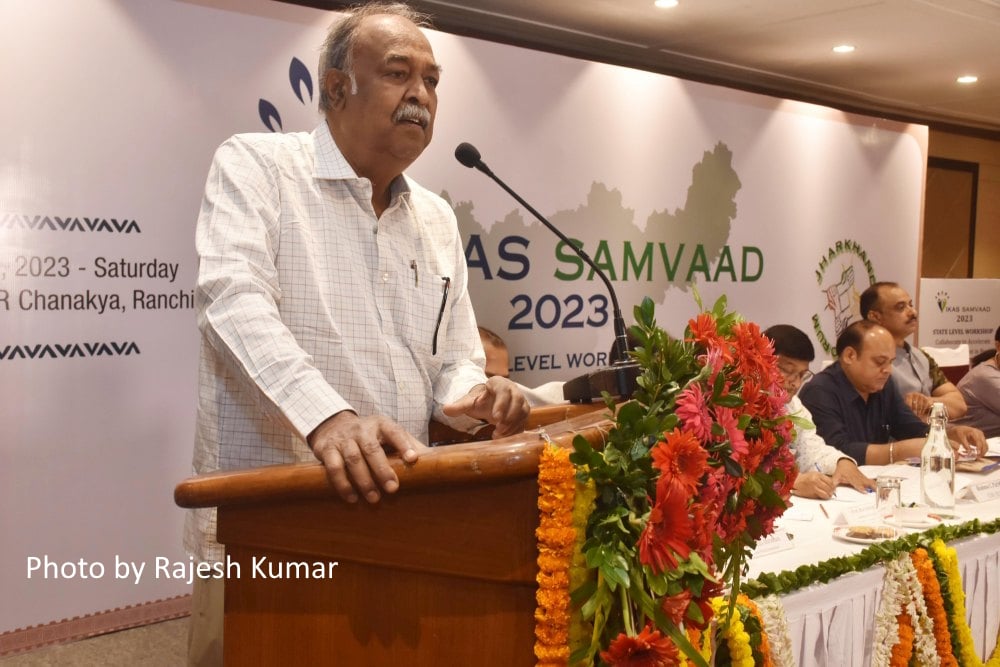Ranchi : One day State level workshop Vikash Samvad organised to eradicate Human Trafficking, Migration, Hunger, Poverty and Unemployment at BNR Chanakya in Ranchi on Saturday.
A Panel of distinguished guests including Eminent Economist and Former Vice Chancellor of Vinoba Bhave University Hazaribagh Prof. Dr. Ramesh Sharan, Economist Prof. Dr. Harishwar Dayal, Officials from Agriculture Department and activists of Civil Society who work in remote areas of Jharkhand.
Discussion was held on Right to Food, Right to Employment, Right to Education and awareness created by civil society.
Development of Panchayati Raj Institutions and targets of Sustainable development goals discussed.
Almost 60 % Population from Schedule Tribe, Schedule Caste and Minorities migrate to different states in search of jobs.
14000 to 15000 Villages in Jharkhand State are affected with Human Trafficking, Malnutrition, exploitation of minerals due to mining, Land Displacement, Dependence of monsoons for irrigation of agricultural field, Unemployment are the main challenges of civil society.
Eminent Economist and Former Vice Chancellor of Vinoba Bhave University Hazaribagh Prof. Dr. Ramesh Sharan was the chief guest on this occasion.
Prof. Dr. Ramesh Sharan said, Uncivil and Uncultured people destroy 80 % Population due to their corrupt activities .
Jhola Chap Economics is influential in the state.
In the Upper level Political Bureaucracy and Hierarchy is strong but in lower level 3rd and 4th Grade Employees are involved in corrupt activities, Prof. Sharan added.
There is a conflict between public and private sector undertakings.
Right to Education, Right to Employment and Right to Food are the brainchild of NGO’s.
Problem of leakages and corruption at lower level and at block level as well as at district level.
Few NGO’s organise funds in wrong ways.
There is doubt on the working of NGO’s.
NGO should have transparency and effective working style to eradicate Hunger, Poverty, Unemployment, Illiteracy, and Climate Change.
There are lots of weaknesses of NGOs and Civil Society.
At the time of COVID lockdown NGOs helped in crisis Management and provided aid to migrant labourers.
National Bank for Agriculture and Rural Development (NABARD) helped the Civil Society to promote Organic Farming and the MGNREGA Programme.
Civil Society provided assistance to pregnant women they care for and look up the medicines.
NGO’s worked during COVID Lockdown and created awareness programmes in the society.
Pradeep Hazari, Secretary Agricultural Department, Government of Jharkhand Said, ” in Last four years rupees 4000 Crore invested on Non Governmental Organisations (NGO) and Civil Society to improve the condition of people of state.”
“And in the next five years, Rs 20,000 Crore is estimated in the budget to invest on NGO’s, ” Hazari added.
Economist Prof. Harishwar Dayal said, “Government failed to provide statistics to define Poverty.”
The Tendulkar Committee, Rangarajan Committee reports to define Poverty is an old method to know the rate of poverty.
Rupees 32 was the definition of poverty by the planning commission before 2014.
Half of 2023 is going to finish till Census operation is not conducted.
There is a need to increase the wages of labourers.
Health tourism and Education Tourism is the key role of development in the state.
West Bengal, Orissa and Jharkhand improved and in better condition in comparison to Bihar.
Cost of living should be declined.
Creativity and innovation are the gift of NGO’s.
Last year Rupees 188 Crore invested in Corporate Social Responsibility (CSR) in Jharkhand.
Whereas in Maharashtra Rupees 2646 crore, Rupees 454 crore in Orissa, Rupees 966 Crore in Karnataka and Rupees 366 Crore in Kerala allocated in the state budget to provide Corporate Social Responsibility (CSR) to help underprivileged people to uplift society from backwardness.

